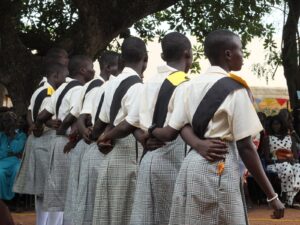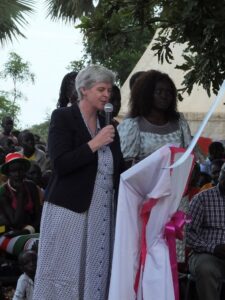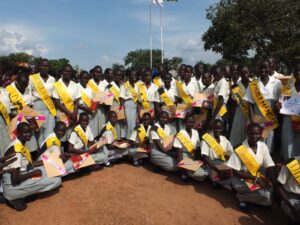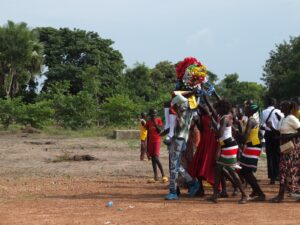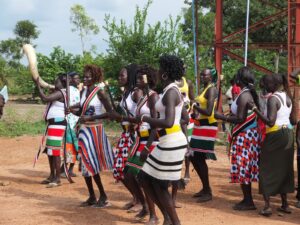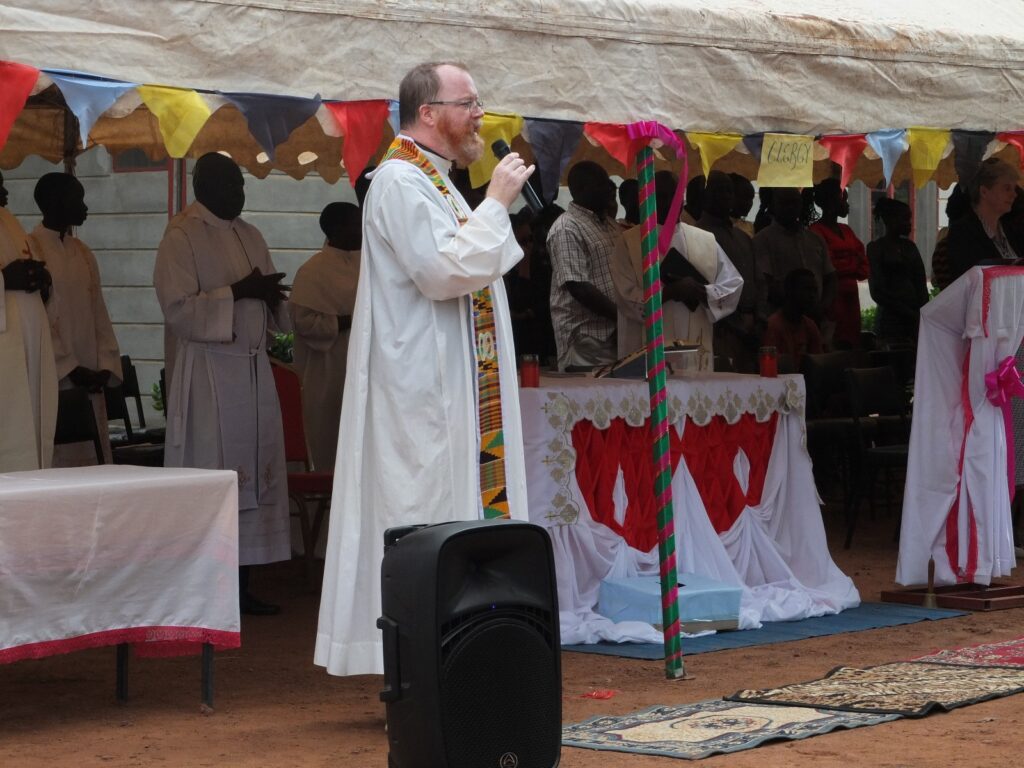 Whistling Tunelessly
Whistling Tunelessly
What is the meaning of happiness? Philosophers have speculated on the topic since the beginning of the human story. The answers provided to date are varied and many, but few would include driving along a dirt road, at night, in the rain, perched precariously on a half a driver’s seat (the rest has somehow mysteriously disappeared over time) in a pick-up truck that your average NCT technician would not only refuse to examine due to concerns for their personal safety, but would happy fire bomb with a Molotov cocktail from the comfort of their office. Yet, this is where I found myself a week ago on a Thursday night, whistling somewhat tunelessly as I drove alone. Happiness. It comes in the most surprising of places.
The destination for my rather battered pickup filled with tables was our clinic, which the following day, would the site of the Loreto Graduation. Over fifty young women marked the end of their formal studies with us and are now looking forward to their Senior Four national exams in just over a week. The day is not just a graduation though. It means much more, as it is a visible sign of how far these young women have come in the face of many challenges. The number of women successfully completing secondary school in South Sudan remains one of the lowest in the world according to the UN.
So, for these young women and their family who attended, it really is something to celebrate. It symbolises a continued new chapter in the history of the country, where slowly (in reality too slowly) women are making their own way in the world. The early mornings and late nights of study, along with their daily classes, have paid off. For their graduation their families all gathered to give thanks to God for what has been achieved in a Mass with Bishop Christian. After that, it was all singing, dancing, and sharing food with one another, but overall it was pure joy. Even the hardest of heart could not help to be happy there.
A Runaway Train
Only two days later, I had another interesting experience. On the Sunday evening I was getting ready for the week ahead, planning for the work in the University and the schools, when I began to feel unbearably cold. A quick check with one of our nurse practitioners confirmed my suspicions. I had my first bout of malaria. If you haven’t had it, it’s difficult to accurately describe. Your fever alternates between being roasting hot and then freezing cold. It’s bizarre to ever think you will end up shaking with the cold, in bed with two blankets, when the room temperature is well into the 30C, but there I was. Thankfully the Sisters moved me into the Convent to keep an eye on me. Hardly necessary in my opinion, as all the world knows how easy Irish men are as patients. You’d hardly think we were sick at all! I was thankful for their care by the time I finished.
Anyway, aside from fever, there are headaches, body aches, nausea, and lots of other things that are perhaps not fit to print. The vivid dreams were something of a shock. In one in particular I found myself at a Eucharistic Congress in a large stadium, when a runaway train barrelled through the proceedings. I hopped on for fun, managed to avoid hitting three trams, before eventually crashing the train just outside a Spar in Ireland. The manager came out to thank me, took my photo, gave me flowers and chocolate, and then charged me for both of them, which I thought was a bit much.
Whatsoever You Do
Now, rambling, nonsensical vivid dream aside, the harsh reality is that malaria is easily one of the main causes of child death in our area. It always bothered me that at the end of the first year pandemic we had six or seven viable vaccines available. Malaria kills over 600,000 people a year, but still we are waiting on a vaccine. Simply put, rich people don’t get malaria, so there is not impetus to find a cure in the same way we came together to tackle Covid. The part of malaria that is most responsible for deaths is the fever. Young children often don’t have the strength to deal with the high temperatures, but all that is needed to reduce their temperature is a simple paracetamol.
Today is the feast of Christ the King and our Gospel from Matthew is one of Jesus’ most challenging and pointed lessons. It’s the story of the final judgement and the separation of the sheep from the lambs. Those who cared for the poor, the naked, the imprisoned, and the sick are welcomed into the Kingdom of God as the Father’s own. Those who don’t, aren’t. But I think there is more to the story. When the people question Jesus, he replies, “Whenever you did this for the least of your brothers and sisters, you did it for me.” We are not just called to serve those in need. Jesus wants more. He wants us to recognise the presence of the divine in them. To see the image of God in everyone, especially those typically most despised. We are all one family. When one suffers, we all do.
It took five days for me to get over my first experience of malaria. I was lucky to have a clinic nearby, access to medication, and a caring community. Not everyone is. That is why the work of not just the school, but the clinic here is indispensable. Life has its highs and lows, and as we give thanks for one, we must remind ourselves to work to help those in the other. That is what Christ demands of us. Nothing less will do.
PLEASE HELP US TO TRANSFORM LIVES IN SOUTH SUDAN
Read more from Fr Alan’s missionary journey in South Sudan:
- Looking for a Sign on the Way to South Sudan
- Building a Better Future in South Sudan
- Christmas Greetings from Fr Alan in South Sudan
- A Cup of Sugar and Maybe a Goat
- Mock Exams and Real Life in South Sudan
- As Easy as Baking a Cake
- Holy Week on the Move
- Three Arrivals and a Party
- Celebrating the Missionary Life
- Seeds of Hope
- Young People Fighting COVID-19 in Rumbek
- Ticket to Ride
- Lions, Snakes, and the World’s Deadliest Predator
- Vaccine Status: Denied
- Christmas in South Sudan
- A Bigger Shovel
- A Week in the Life of Loreto – Bishops, graduations, an ambassador, and the Pope
- Sowing Seeds
- A visit from the MSC Superior General
- Advent
- Do They Know It’s Christmas Time?
- Fr Alan in South Sudan: The Papal Visit
- Life Goes On
- Give Peace A Chance
- The Surprising Grace of Hospitality: Part 1
- Everyone is included, The Surprising Grace of Hospitality – Part 2
